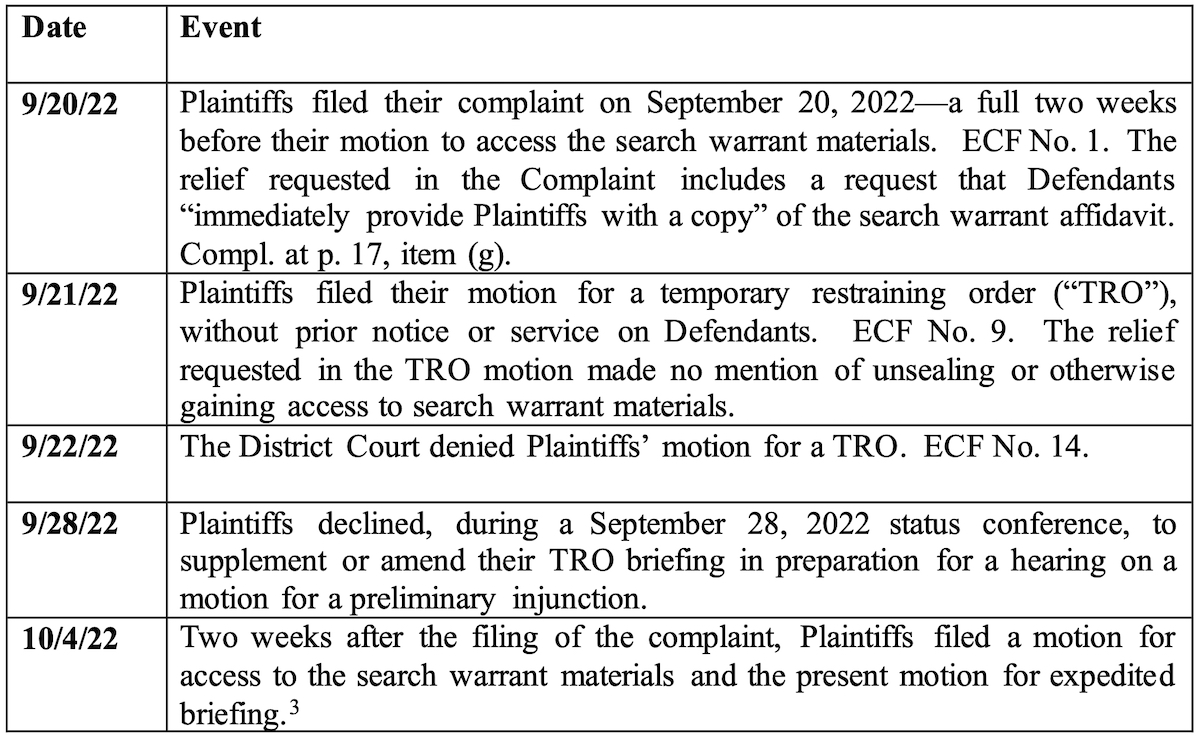
MyPillow CEO Mike Lindell waits outside the West Wing of the White House before entering on January 15, 2021. (Photo by Drew Angerer/Getty Images.)
The U.S. Department of Justice on Thursday opposed Mike Lindell’s request to fast-track judicial review of a demand to access to an FBI affidavit that led to the seizure of the MyPillow CEO’s company-issued cell phone. By opposing the request, the DOJ skewered Lindell’s attorneys for altering the goals of their litigation strategy.
As Law&Crime reported on Wednesday, U.S. Magistrate Judge Elizabeth Cowan Wright told the DOJ to respond to Lindell’s request for an expedited review of the matter by 9 a.m. on Thursday.
The DOJ’s subsequent reply employed a two-pronged argument. First, the government said Lindell hadn’t “shown good cause for an expedited hearing.” Second, the government said the overall request was “inextricably linked to the merits” of Lindell’s entire lawsuit against the government and therefore could not be rushed.
“The motion to obtain access to search warrant materials is not a preliminary matter that can be resolved before the hearing on Plaintiffs’ motion for a preliminary injunction,” the DOJ wrote. “Rather, Plaintiffs are not entitled to access the search warrant affidavit unless and until a criminal prosecution of one or more Plaintiffs occurs.”
The DOJ filing notes that Magistrate Judge Tony N. Leung issued a warrant for Lindell’s phone on Sept. 7, 2022, and that the warrant was executed on Sept. 13, 2022. Lindell has said for weeks that the FBI seized the phone while he was positioned in a Hardee’s fast food restaurant drive-thru.
“The warrant also authorized the seizure of the cell phone as well as records constituting fruits, evidence, or instrumentalities of three enumerated offenses: 18 U.S.C. §§ 1028(a)(7) (identity theft), 1030(a)(5)(A) (intentional damage to a protected computer), and 371 (conspiracy to commit identity theft and/or to cause intentional damage to a protected computer),” the DOJ confirmed in Thursday’s filing.
Lindell’s attorneys filed what they purported to be a copy of the warrant on Sept. 21. However, on Sept. 30, the DOJ said during a telephone conference that it was “not conceding” whether the proffered document was a “true and correct” copy of the original.
If the document is accurate, it asserts that the DOJ is investigating whether the aforementioned crimes were committed connection with efforts to investigate conspiracy theories about the 2020 election. Lindell has claimed that President Joe Biden defeated Donald Trump because of rigged equipment, a theory rejected by every court that has examined it. A list of “subjects” of the government’s probe included Tina Peters, a Colorado county clerk who is embroiled in 2020 election-related criminal proceedings in her home state. In federal parlance, however, “subjects” of investigations are not putative defendants; they were merely individuals whose conduct is within the scope of a grand jury probe.
Lindell, naturally, was also listed as a “subject” of the probe.
The MyPillow CEO and staunch Trump supporter filed suit on Sept. 30 by “alleging that the warrant and its execution violated the First, Fourth, Fifth, and Sixth Amendments to the United States Constitution,” the DOJ noted.
Or at least that’s what Lindell claimed.
“Although the Complaint alleges that the government’s actions ‘denied [Mr. Lindell] his Sixth Amendment rights,’ the Complaint does not contain a specific count premised on that violation,” the DOJ noted.
Lindell and MyPillow both initially moved on Sept. 20 for a temporary restraining order that would force the government to return his phone and stop reviewing its contents. However, on Oct. 4, 2022, they sought access to the sealed affidavit which gave rise to the search warrant.
“[N]one of the search warrant documents should be unsealed unless and until a criminal prosecution commences,” the DOJ reasserted.
The government then commenced a series of slams against Lindell’s change in litigation strategy and other alleged failures (we’ve omitted the citations and parenthetical references to case law):
Plaintiffs’ motion is the result of a manufactured emergency created by their own failure to proceed with due diligence in this matter. Ordinarily, responses to non-dispositive motions are due seven days after the motion is filed. The briefing schedule can be expedited for good cause shown. A showing of good cause should necessarily include a requirement that the moving party has proceeded with due diligence.
Here, Plaintiffs’ are using their failure to file pleadings in a sensible order or on a sensible timeline to argue that there is an urgency to their motion to obtain access to the search warrant materials.
A chart showing various motions and conferences then was issued to support the DOJ’s point.

(Image via federal court paperwork.)
“This timeline shows that Plaintiffs knew that they were seeking access to the search warrant materials at the inception of this case on September 20, but made no effort to obtain that relief until briefing on a preliminary injunction was well underway, and their motion for a TRO had already been denied,” the DOJ argued.
The pile-on continued in a footnote that referenced local court rules:
A further example of Plaintiffs’ lack of due diligence is that neither of these motions complies with the Local Rules, as Plaintiffs did not obtain a hearing date in advance for either motion by contacting the presiding Magistrate Judge, see D. Minn. LR 7.1(b). The motion for expedited handling is also missing numerous supporting documents including a memorandum of law, a notice of hearing, and a meet-and-confer statement.
“The Court should reject Plaintiffs’ efforts to cause a fire drill at this stage in the case because of their unjustified two-week delay in filing a motion for access to the search warrant materials,” the DOJ continued. “It is Plaintiffs who are seeking expedited briefing, and Plaintiffs who initiated this lawsuit. The onus was on them to timely seek appropriate relief.”
The DOJ said Lindell and MyPillow seem to want access to the affidavit to “assist them in their arguments in support of the preliminary injunction.”
“Plaintiffs have it backwards,” the DOJ said. “The Court should reject Plaintiffs’ attempt to scramble the orderly progress of this case through eleventh-hour requests for extraordinary relief. Plaintiffs’ right of access to the search warrant materials is a key merits issue in this case that will need to be resolved by the District Court after full briefing and argument.”
The “appropriate schedule,” the government said, would allow the DOJ to respond to Lindell’s request for the warrant materials on Oct. 14.
The full government reply is below: